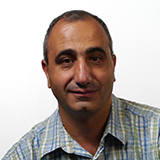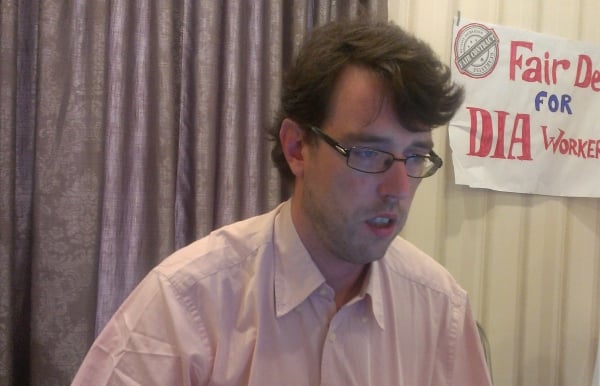Adrien Collin is projects officer at the International Federation of Journalists (IFJ), where he has been working since 2010. Adrien has organized media development programmes for journalists in the countries of the former Soviet Union.
One of the IFJ’s newest initiatives is the EU-funded “Improving the Capacity of Journalists’ Trade Unions In South Caucasus” program. Media.am staff recently spoke with Adrien in Batumi about this program.
Adrien, why did you decide to implement this program? What is its main aim?
The main aim is to really transform and modernize the trade union of journalists that are members of the International Federation of Journalists. They are not all trade unions — some are associations, so they cover more professional issues. And with this program we want them to address the problems of the labor conditions of journalists and also the trade union rights of journalists; [that is,] the right for workers to organize themselves [and] to be represented by trade unions and associations.
Why trade unions in particular?
This is the core work of the International Federation of Journalists. We work in 134 countries [and] represent around 600,000 workers, so this is our core mandate: develop trade unions so that they are able to protect the rights of workers.
[The] idea of this project came from our experience in another project in South Caucasus where basically we could identify problems with the trade union that was not really protecting the rights of journalists. We felt that it was important to develop a specific project about this subject, so that our trade unions become more relevant for journalists.
Trade unions in the South Caucasus] are very weak in numbers, so they do not represent enough workers to be considered as a leading player in the field of the defense of labor rights. So this is why we are developing this program to make the organizations more representative of journalists.
In Armenia, we have no trade unions for journalists, but we have the Union of Journalists of Armenia. In your opinion, how is the situation in Armenia in terms of journalists’ trade unions?
This is a problem in the entire region, but in Armenia it is the case that journalists do not trust the current organization because when it has the word “union” in its title it is always associated with the old Soviet Union structures of what was a trade union, [which] offer[ed] sanitorium trips and those type of advantages but that’s it. And for us, a trade union is quite different from offering only trips to sanitoriums. It has to defend the rights of the workers; it has to make sure that journalists have proper contracts.
In Armenia like in other countries, you have the problem of contracts where you have minimum amount of salary that is being declared by the employer and then on
| “In Armenia like in other countries, you have the problem of contracts where you have minimum amount of salary that is being declared by the employer and then on top of that you have this practice of paying journalists with envelopes [i.e. under the table].” |
top of that you have this practice of paying journalists with envelopes [i.e. under the table]. This is obviously a very bad practice because you can then pressurize journalists and those journalists are not then free and independent to be able to produce high enough quality standards journalism.
You have some journalists who do blackmail also: [they tell people,] “If you don’t give me money, I will write this, this, and this information,” which is a practise that amounts to misinformation and is unethical.
Overall, by improving the labor conditions of journalists, journalists will be in a better position to inform the general public about the main issues that are at stake in a new democracy like in Armenia.
It’s obvious that in post-Soviet countries like ours there is no culture of trade unions. Even if trade unions exist, they are weak, and we have a very long way to go. What do you think, what do we have to do to strengthen the journalists’ union in particular?
It took us in Europe more than a hundred years to have trade unions as we have them today. So it is, indeed, a new democracy. It will take time. You have this heritage of the Soviet Union, which is not easy for the current organizations that are working in this field. Indeed, there is a real lack of trade union awareness and what those organizations should be doing. So part of [our] project — and this is one of the most important components — is to be able to create local capacities, in order for local Armenian journalists to be able to train their colleagues (journalists) about what is a trade union, what should a trade union do, how do you organize yourself to better defend the rights of the workers, how do you set up branches in the different media organizations. So that’s a very important aspect of our program.
Obviously, one of our target groups in this project is to involve young[er] journalists into the work of the trade union. We will organize specific trainings to tell them what is the union today, how they can contribute to its modernization and how they can become more active in its work
Parallel to that, we will also develop a legal program because you also have lots of violations of rights of journalists by employers, so it is important that the IFJ together with its partners on the ground can take up cases. Obviously, if we can solve cases of violations without having to go to court, this would be what we are looking for, but in some cases it’s important that we show employers that they cannot violate the rights of journalists like that. So one of the aims would be to take up a couple of cases [which] would also help the recruitment program that we have because it’s only with big numbers of journalists being represented in the union that it can become a real player and that it can become more representative [which,] in turn, will make the union more influential as well.
Indeed, you [in Armenia] have the laws (all the laws are in place), but they are not implemented as they should be. So another part of our program is that we want to create a dialogue with the authorities in order to discuss ways to reform the laws that are currently in place, and most importantly the application of those laws. So this — what we call institutional dialogue — will also involve other NGOs as well as employers themselves. We want to talk to employers. For those that we have met, there is a will[ingness] to accept trade union branches into their organizations. We will see exactly what will happen [in the future].
| “Overall, by improving the labor conditions of journalists, journalists will be in a better position to inform the general public about the main issues that are at stake in a new democracy like in Armenia.” |
Another important aspect of the work will be also to train the current leadership of our trade unions so that they can set up new strategies in order to become more relevant. We need to have unions that are more transparent, communicate more, [and] are more visible to the journalist community.
So does it mean that the Union [of Journalists of Armenia] itself must change, become stronger, work with journalists more, and play a more active role in the media field?
Exactly. We think that at this moment of time, while the union or the association is doing its work, it can do much better and much more in terms of activities to address the needs of journalists. So as part of our project we are going to do audits and assessments of the current situation, as well as surveys, to know if the current mission of our partners is still in line with the actual realities that journalists are facing and what the journalists themselves are expecting a trade union or an association to do.
And so, with all those activities, we hope to make the union more relevant to the current challenges that journalists are facing on the ground — one being, obviously, the salary conditions, contracts and working conditions. You have a lot of problems with violations of working hours, for instance. Journalists will tell us what is important for them, what the union should do.
Another very important aspect is to involve all the stakeholders and to organize this in a participatory type of approach, because in the Soviet period the union would say this is what we need to do and this was not always relevant, according to the needs. Now we want to change it by putting the journalists at the centre of our approach.
The heart of the union is [its] members. It’s the members who create a strong and dynamic union. So this is why we need to have more.
Interview conducted by Gegham Vardanyan







